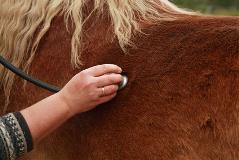Sudden Cardiovascular Collapse Related to Equine Arrhythmias

As the 141st Kentucky Derby at Churchhill Downs in Louisville, Kentucky approaches, owners, jockeys, trainers, veterinarians and their horses will see the conclusion of the year’s hard work and training. Not all horses make it this far, but many still put in months of training and preparation for a possible spot at the top.
Cardiovascular Collapse
High levels of training and conditioning are required to properly prepare a horse for racing. These animals are athletically fit and able to tolerate high levels of cardiovascular stress. Sometimes, however, racehorses who reach a maximum level of physical exertion over a short period of time experience a sudden cardiovascular collapse. The cause of this type of collapse is not fully understood, but it is believed to be associated with the increased level of stress that the exertion places on the heart.
Points to Know
Normal physiological data:
- At rest:
During maximal physical exercise, a horse experiences:
- Cardiac output increases to seven times normal
- Heart rate increases to 220 beats per minute
- Blood flow of up to 20 times that of the resting state
While the horse is in this maximal physical exercise state:
- Heart works with a deficiency of oxygen, in a hypoxic state
- With continued exertion, heart becomes unable to supply oxygen to muscles
- Heart may decompensate
Sudden cardiovascular decompensation is thought to be caused by cardiac arrhythmias. Arrhythmias are:
- Various electrical disturbances in the heart’s conduction system
- Physiologically common in horses, often disappearing with exercise
- Found in racehorses, appearing with maximal exercise by causing a sudden drop in blood pressure
- Capable of causing a collapse in horses with seemingly normal hearts
- Found in horses with underlying heart muscle disease such as myocarditis or cardiomyopathy
Signs to watch for:
- Heart beating excessively faster than normal
- Heart beating excessively slower than normal
- Increased respiratory rate
- Swelling of tissues
- Disorientation
- Loss of performance
- Presence of a heart murmur
Treatment:
- Restore the natural heart rhythm so heart beats regularly
- Monitor the heart with an electrocardiogram
- Treatment may include medication to restore the natural rhythm
- Treatment may require surgery
Prevention
In order to attain the level of conditioning necessary for a horse to succeed in racing the horse must be free of health problems that compromise the efficiency of the heart and lungs, for example:
- Anemia
- Valvular heart disease
- Myocarditis
- Intestinal parasites
- Bronchitis
- Heaves
Horses used for racing should receive the following preventative care:
- Cardiac screening
- Respiratory disease screening
- Exercise program that is geared to obtain maximum athletic fitness
- Be monitored for any signs of exhaustion
Researchers are attempting to discover the association between sudden cardiac collapse and arrhythmias that develop during exercise. It is known that horses can develop exercise arrhythmias without any consequences, but research has yet to determine what draws the line between non-harmful arrhythmias and dangerous arrhythmias. Need more information on Equine Health? Contact your Covetrus representative today at 855.724.3461.


Working Here
Our team members are encouraged to be the best they can be... at Covetrus we believe we impact one another.
Learn MoreNews & Events
FDA Cautions Pet Owners Not to Feed Texas Tripe Inc. Raw Pet Food Due to Salmonella, Listeria Monocytogenes
The U.S. Food and Drug Administration is cautioning pet owners not to feed their pets any of the Texas Tripe brand raw frozen pet food listed below because several samples of Texas Tripe raw pet food have tested positive for Salmonella and/or L. mono.
Careers
Are you looking for a place to let your talents shine? At Covetrus, we help our practitioner customers better serve their patients and take pride in providing the best customer experience possible. Search our open positions to see our available opportunities.
Newsletter
Stay current with what’s going on with Covetrus, subscribe to receive our newsletter and email communications. Subscribers will receive the latest information in practice management, sales and marketing, animal health, and more.



-3-(1).png?sfvrsn=2d806d73_0)

Leave a comment